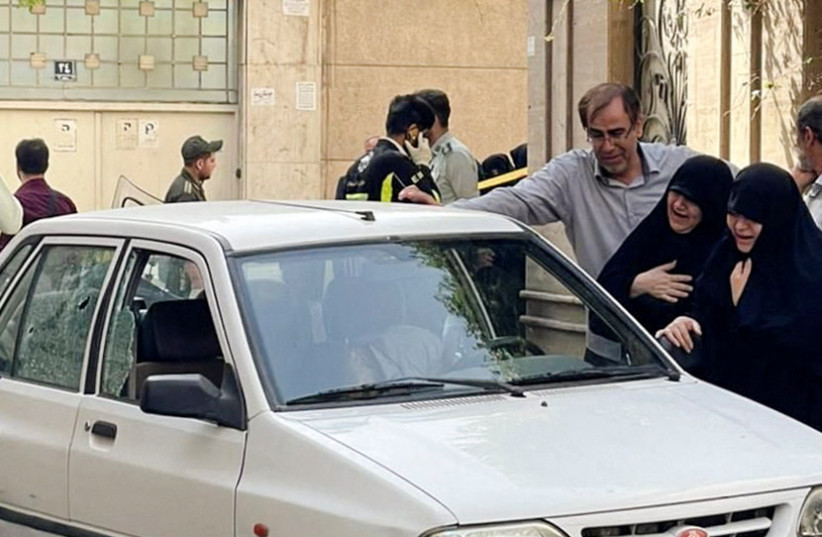Four Iranian officials have died in mysterious circumstances and another was kidnapped in Tehran in the past month, and the Islamic Republic has blamed Israel for all the incidents.
Target #1: Mansour Rasouli
The series of events began with the abduction of Mansour Rasouli in April. Rasouli, a purported member of the Islamic Revolutionary Guard Corps admitted to Mossad agents at his home in Iran that he was sent to target an Israeli diplomat in Turkey, an American general in Germany and a journalist in France.
Rasouli was later released and denied his earlier confession. But, a statement from the Prime Minister’s Office said that the Mossad had “foiled” alleged IRGC plots to assassinate a US general in Germany as well as a journalist in France, and an Israeli diplomat in Turkey.
Target #2: Hassan Sayad Khodaei

A few weeks later, on May 22, Hassan Sayad Khodaei, a senior member of the IRGC, was killed in his car outside his home in central Tehran by two assassins on a motorcycle, alleged by Iran to be Mossad agents.
According to reports, Khodaei was close to former IRGC Quds Force commander Qassem Soleimani, who was killed in an American drone strike in Baghdad in January 2020.
He is alleged to have smuggled weapons to Syria and planned kidnappings and attacks against Israelis and Jews around the world. Khodaei also commanded the IRGC’s Quds Force’s Unit 840, a relatively secret outfit that builds terror infrastructure and plans attacks against Western targets and opposition groups outside Iran.
Rasouli reportedly operated under Khodaei’s command in Unit 840.
Though Israel has remained officially silent, The New York Times reported that an unnamed Israeli official informed US officials that Jerusalem was responsible for Khodaei’s killing.
Target #3: Ali Esmaelzadeh
A week later Colonel Ali Esmaelzadeh, who also served in Unit 840 along with Rasouli and Khodaei, died after falling from the balcony of his home in the Jahan Nama area of Karaj.
The Saudi-financed, London-based Persian-language television channel Iran International first reported Esmaeldzadeh’s death and said that the IRGC told his family that he had committed suicide after he separated from his wife.
But, the report said, “sources said that after Sayyad Khodaei’s killing the IRGC intelligence looking for security leaks from within the Quds Force became suspicious of Esmaelzadeh and decided to eliminate him by organizing a suicide scenario.”
Khodaei and Esmaelzadeh were said by Iran International to have been close colleagues.
All official Iranian media outlets have reported his death as an accident or suicide. Unlike Khodaei, the IRGC did not issue any statement following his death and his funeral took place in his home province of Hamedan under a media blackout.
According to The NYT, two senior defense officials said that Israel did not kill Esmaelzadeh.
Just days after Esmaelzadeh’s death, on May 25, a defense ministry engineer was killed in a drone attack at the Parchin military site outside Tehran where Iran develops missile and nuclear and drone technology.
Target #4: Ayoob Entezari
Then, on May 31, Iranian aerospace scientist Ayoob Entezari died in a hospital in the central province of Yazd after he was allegedly poisoned at a dinner he attended. The man who hosted the dinner reportedly fled Iran shortly afterward.
Entezari, who held a PhD in mechanical and aerospace engineering from Tehran’s Sharif University, was reportedly involved in Iran’s missile and drone industry. According to Iran International, Yazd’s governor-general’s office said that Entezari was a martyr, a turn used to describe those who have died while in the line of duty.
Israel has been blamed for many deaths in Iran including nuclear scientists, among them Mohsen Fakhrizadeh, who many referred to as the “father” of Iran’s nuclear weapons project, who was assassinated in November 2020.
However, it is hard to fathom that the mysterious deaths of IRGC Quds Force officers all serving in the same elite unit and an engineer and a senior scientist involved in aerospace engineering are a coincidence.
All cases appear to be a clear change in targets in Israel’s war-between-wars campaign (MABAM) that aims to prevent the Islamic Republic from acquiring a nuclear weapon, to prevent Iran’s entrenchment in Syria and to bring an end to its hostility.
